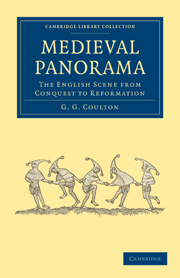Book contents
- Frontmatter
- Contents
- Illustrations
- Preface
- Introduction
- Chapter 1 The Cauldron of God's Wrath
- Chapter 2 Bishops of Rome
- Chapter 3 Conversion of the Wild Men
- Chapter 4 Feudalism emerges
- Chapter 5 Land and Folk
- Chapter 6 The Village (1)
- Chapter 7 The Village (2)
- Chapter 8 Village Dance and Song
- Chapter 9 Nature and Superstition
- Chapter 10 Popes and Prelates
- Chapter 11 Rector and Vicar
- Chapter 12 The Making of a Priest
- Chapter 13 Church statistics
- Chapter 14 The Shepherd
- Chapter 15 The Flock (1)
- Chapter 16 The Flock (2)
- Chapter 17 The Silver Lining
- Chapter 18 Dante's Commedia
- Chapter 19 The Royal Court
- Chapter 20 Chivalry
- Chapter 21 Chaucer and Malory
- Chapter 22 The Monastery
- Chapter 23 Cloister Life
- Chapter 24 The Town
- Chapter 25 Home Life
- Chapter 26 Trade and Travel
- Chapter 27 Just Price and Usury
- Chapter 28 The Ghetto (1)
- Chapter 29 The Ghetto (2)
- Chapter 30 Justice and Police
- Chapter 31 From School to University
- Chapter 32 Scholastics and Bible
- Chapter 33 Science
- Chapter 34 Medicine
- Chapter 35 Freethought and Inquisition
- Chapter 36 The Papal Schism
- Chapter 37 The Lollards
- Chapter 38 The Black Death
- Chapter 39 The Hundred Years' War
- Chapter 40 The Mystics
- Chapter 41 The Peasant Saint
- Chapter 42 Artist Life
- Chapter 43 Literary Life
- Chapter 44 Sports and Theatre
- Chapter 45 Women's Life
- Chapter 46 Marriage and Divorce
- Chapter 47 The Old and the New
- Chapter 48 More and Utopia
- Chapter 49 The Fight for the Bible
- Chapter 50 The Open Bible
- Chapter 51 Peasant and Highbrow
- Chapter 52 The Bursting of the Dykes
- Notes
- Index
- Plate section
- Frontmatter
- Contents
- Illustrations
- Preface
- Introduction
- Chapter 1 The Cauldron of God's Wrath
- Chapter 2 Bishops of Rome
- Chapter 3 Conversion of the Wild Men
- Chapter 4 Feudalism emerges
- Chapter 5 Land and Folk
- Chapter 6 The Village (1)
- Chapter 7 The Village (2)
- Chapter 8 Village Dance and Song
- Chapter 9 Nature and Superstition
- Chapter 10 Popes and Prelates
- Chapter 11 Rector and Vicar
- Chapter 12 The Making of a Priest
- Chapter 13 Church statistics
- Chapter 14 The Shepherd
- Chapter 15 The Flock (1)
- Chapter 16 The Flock (2)
- Chapter 17 The Silver Lining
- Chapter 18 Dante's Commedia
- Chapter 19 The Royal Court
- Chapter 20 Chivalry
- Chapter 21 Chaucer and Malory
- Chapter 22 The Monastery
- Chapter 23 Cloister Life
- Chapter 24 The Town
- Chapter 25 Home Life
- Chapter 26 Trade and Travel
- Chapter 27 Just Price and Usury
- Chapter 28 The Ghetto (1)
- Chapter 29 The Ghetto (2)
- Chapter 30 Justice and Police
- Chapter 31 From School to University
- Chapter 32 Scholastics and Bible
- Chapter 33 Science
- Chapter 34 Medicine
- Chapter 35 Freethought and Inquisition
- Chapter 36 The Papal Schism
- Chapter 37 The Lollards
- Chapter 38 The Black Death
- Chapter 39 The Hundred Years' War
- Chapter 40 The Mystics
- Chapter 41 The Peasant Saint
- Chapter 42 Artist Life
- Chapter 43 Literary Life
- Chapter 44 Sports and Theatre
- Chapter 45 Women's Life
- Chapter 46 Marriage and Divorce
- Chapter 47 The Old and the New
- Chapter 48 More and Utopia
- Chapter 49 The Fight for the Bible
- Chapter 50 The Open Bible
- Chapter 51 Peasant and Highbrow
- Chapter 52 The Bursting of the Dykes
- Notes
- Index
- Plate section
Summary
This, after all, is the field in which medieval science can best be studied; for here we have something in which all men are interested, great and small. Why was medieval progress so slow in a matter so vital to every rank of society? It is fairly comprehensible that clerical conservatism should have cared little for Bacon's ideal of a scientifically accurate Bible or accurate translations from the Greek Fathers; and, again, that nobody should have paid attention to his hint of possible aeronautics; or, still further, that his similar surmise of an American Continent should have slumbered until it was picked up by Cardinal Peter d'Ailly in the fifteenth century, and treated more seriously by Columbus a couple of generations later. We are not so very much surprised, again, that Europe should not have taken to printing until more than a century after Marco Polo's description of China might have shown the way. But it is far more strange that, in medicine, Dr Singer can pass on from the death of Galen (a.d. 199) to write, “the Dark Ages [for medicine] have begun. Anatomy in the pagan world descends into darkness more abruptly, but not more surely, than philosophy.” Here again we must note what the date proves, that it is not merely a question of Christian influence; decay had already set in before Constantine the Great. But why, when the world settled down again, was there not a more real advance in medicine?
- Type
- Chapter
- Information
- Medieval PanoramaThe English Scene from Conquest to Reformation, pp. 444 - 456Publisher: Cambridge University PressPrint publication year: 2010First published in: 1938



